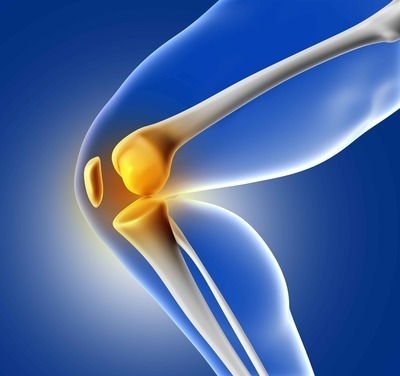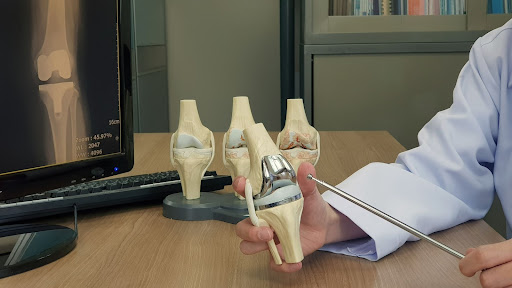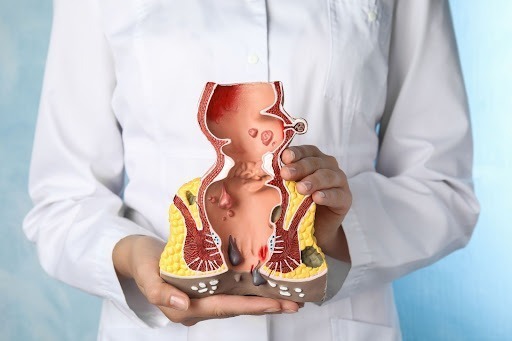Orthopaedic / Total Knee Replacement
Total Knee Replacement (TKR): Regain motion, reclaim life

by admin
14th January 2020
5 minutes read
There is a high chance that you may have heard f knee replacement surgery or of someone who has undergone the same. This is because knee replacement surgery has become common nowadays.
The knee might get damaged due to arthritis or injury. As a result, a person may experience knee pain. Sometimes, knee pain can turn out to be chronic and may affect day-to-day activities and decrease the quality of life. In such situations, doctors may suggest a knee replacement surgery.
Causes of Knee Pain
Arthritis or injury may cause knee pain. Although there are several types of arthritis, osteoarthritis and rheumatoid arthritis are the most common causes of knee pain.
Osteoarthritis
Osteoarthritis is an age-related “wear and tear” type of arthritis. Apart from wear and tear and age, there are some other factors that can contribute to osteoarthritis. They are heredity, obesity, injury or in some cases other diseases.
In osteoarthritis, the cartilage that acts as cushions between bones of the knee, starts to wear away. As a result, the bones start rubbing against one another causing knee pain and stiffness.
Rheumatoid Arthritis
The tibia and femur are surrounded by a membrane known as the synovial membrane. When the synovial membrane becomes inflamed, it can damage the articular cartilage causing pain, cartilage loss and stiffness. This is called rheumatoid arthritis.
Injury
When the knee is injured or the bones are fractured, it may damage articular cartilage resulting in knee pain.
When does one need to go in for a knee replacement surgery?
The orthopedic surgeon will suggest knee replacement surgery only if the patient will benefit from it. Some of the factors that the orthopedic surgeon will look at are:
-
Stiffness or severe knee pain that affects your daily life.
-
Chronic knee inflammation
-
Knee deformity
-
When other treatments for knee pain have failed.
Depending on the condition, he may choose either partial knee replacement or total knee replacement.
Pre-surgical procedures
After a patient has decided to go ahead with the Total Knee Replacement surgery, the patient has to undergo a few pre-surgical procedures. They are:
-
Full body health checkup in order to make sure that he/she is in good health.
-
Medical history of the patient is studied to avoid any complications during or after the surgery.
-
He/she may be asked to stop taking medications such as blood thinners one week before the surgery.
-
The patient has to fast for 8 hours before the surgery.
Total Knee Replacement Procedure
Once the surgeon is sure that the patient is healthy and ready, the patient can undergo Total Knee Replacement surgery. During surgery, the surgeon makes an approximately 6-inch incision along the front of the knee and stabilizes the MCL (Medial Collateral Ligament) and LCL (Lateral Collateral Ligament). Then the surgeon removes the meniscus and shapes the tibia and femur. The surgeon then screws down the implants and closes the incision.
Post Surgical Care
The main focus of post-surgical care is to help the body adjust to the new prosthesis (knee implants). The patient is initially asked to do small exercises and movements. Once the patient is able to walk, the physiotherapist will plan a range of exercises and workouts to help the movements of the joint.
The doctor may advise some modifications to a patient’s house like raising toilet seat, attaching proper rails to stairs and placing a seat in shower in order to help with recovery. The doctor may prescribe walker, waterproof dressing and medicines like painkillers to help manage the pain.
Dos and Don’ts after a total knee replacement
The patient has to be careful about particular things after total knee replacement surgery, they are:
-
Don’t put weight on the knee and Do use crutches or walking sticks.
-
Don’t wet your dressing.
-
Don’t climb stairs with the operated leg.
-
Do sit on a chair or use western toilets.
Possible complications of total knee replacement
Some of the complications that a patient may face after total knee replacement surgery are:
-
Infection at the site of surgery
-
Periprosthetic fractures
-
Dislocation
-
Anterior knee pain
FAQs
FAQ 1. How painful is a total knee replacement?
Ans. The patient will be under anesthesia during surgery, so he/she won’t feel the pain. To manage post-surgery pain, the doctor usually prescribes pain killers.
FAQ 2. How long does it take to recover from a knee replacement?
Ans. The recovery process depends on the regular habits of the patient. In order to recover quickly, the patient must make sure of following these points:
-
The patient will have to stay in bed for a few days after the surgery. Some doctors may allow the patient to walk a few steps everyday.
-
After that, the patient can start walking but he/she should not apply too much weight on the operated knee. The patient will have to use a walker for any movement.
-
The patient has to undergo physiotherapy for a few weeks (3 weeks) to a few months (ideally 3 months) after which he/she can get back to their regular lifestyle.
FAQ 3. What is replaced in a total knee replacement?
Ans. In total knee replacement surgery, the surgeon removes the meniscus, cartilage and reshapes femur, tibia, and in some cases the patella. Then the surgeon places implants on the reshaped surfaces.
Basically, the surgeon is replacing the damaged cartilage and ends of bones (femur and tibia) with artificial implants.
FAQ 4. How much does a total knee replacement cost?
Ans. Cost for total knee replacement may vary based on the city and hospital. You can talk to a Medfin expert, who will guide you through the entire process.
If you have any query, feel free to call us at 7026 200 203
CATEGORIES
- ACL Reconstruction
- Anal Fissures
- Anal Fistula
- Appendicitis
- ASK A DOCTOR
- Benign Prostatic Hyperplasia
- Breast Lump Excision
- Cataract
- Circumcision
- Conditions & Diseases
- Cosmetology
- Covid-19
- Cure
- Endocrinology
- ENGLISH VIDEOS
- Eye Care
- Gallstones
- General Surgeries
- Government Schemes
- Gynaecology
- Gynecomastia
- Health
- Health Insurance
- Hernia
- Hindi
- Hip Arthoscopy
- Hip Replacement
- Hip Replacement Surgery
- Hydrocele
- Kannada
- Kidney Stones
- Knee Arthroscopic
- Laparoscopic
- LASER
- Latest Treatments
- Lifestyle
- Liposuction
- Medfin Stories
- Medicine
- Nephrology
- Ophthalmology
- Orthopaedic
- Paraphimosis
- Patient Testimonials
- PCL Reconstruction
- Phimosis
- Piles (Hemorrhoids)
- Pilonidal Sinus
- Proctology
- Prostate Artery Embolization
- Rhinoplasty
- Second Opinion
- Total Knee Replacement
- Urology
- Uterine Artery Embolization
- Uterine Fibroids
- Varicocele
- Varicose Veins
- Vascular
- VIDEOS







